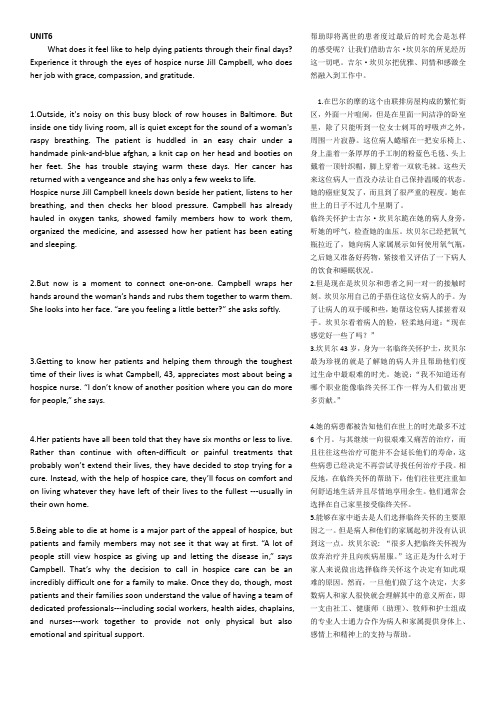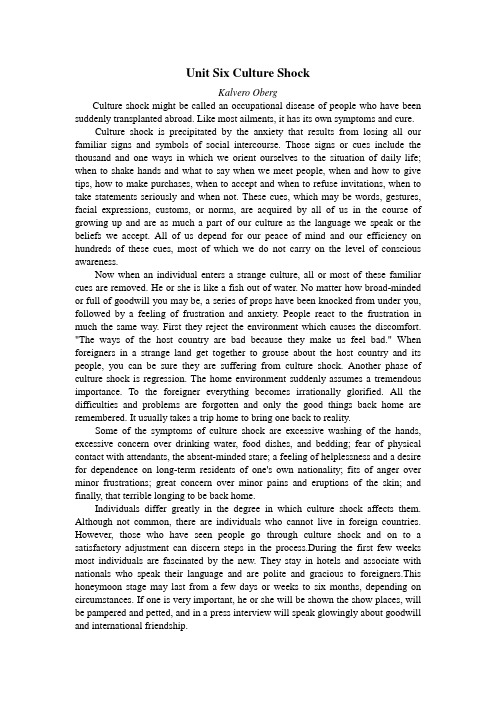研究生英语课程unit6
研究生英语综合教程UNIT6课文及翻译(含汉译英英译汉)

UNIT6What does it feel like to help dying patients through their final days? Experience it through the eyes of hospice nurse Jill Campbell, who does her job with grace, compassion, and gratitude.1.Outside, it's noisy on this busy block of row houses in Baltimore. But inside one tidy living room, all is quiet except for the sound of a woman's raspy breathing. The patient is huddled in an easy chair under a handmade pink-and-blue afghan, a knit cap on her head and booties on her feet. She has trouble staying warm these days. Her cancer has returned with a vengeance and she has only a few weeks to life. Hospice nurse Jill Campbell kneels down beside her patient, listens to her breathing, and then checks her blood pressure. Campbell has already hauled in oxygen tanks, showed family members how to work them, organized the medicine, and assessed how her patient has been eating and sleeping.2.But now is a moment to connect one-on-one. Campbell wraps her hands aro und the woman’s hands and rubs them together to warm them. She looks into her face. “are you feeling a little better?” she asks softly.3.Getting to know her patients and helping them through the toughest time of their lives is what Campbell, 43, appreciates most about being a hospice nurse. “I don’t know of another position where you can do more for people,” she says.4.Her patients have all been told that they have six months or less to live. Rather than continue with often-difficult or painful treatments that probably won’t extend their lives, they have decided to stop trying for a cure. Instead, with the help of hospice care, they’ll focus on comfort and on living whatever they have left of their lives to the fullest ---usually in their own home.5.Being able to die at home is a major part of the appeal of hospice, but patients and family members may not see it that way at first. “A lot of people still view hospice as giving up and letting the disease in,” says Campbell. That’s why the decision to c all in hospice care can be an incredibly difficult one for a family to make. Once they do, though, most patients and their families soon understand the value of having a team of dedicated professionals---including social workers, health aides, chaplains, and nurses---work together to provide not only physical but also emotional and spiritual support. 帮助即将离世的患者度过最后的时光会是怎样的感受呢?让我们借助吉尔·坎贝尔的所见经历这一切吧。
研究生英语(人大版第三版)u6

PPaarrtt3 1(0P-a1r2a10-12)
• [10] we must accept our losses,and learn how to let go.
• 为了要解决这个矛盾,我们必须寻找一个较为广阔的视角 ,透过通向永恒的窗口来观看我们的生命。
• [15] Life is never just being.
• 生命绝不只是存在。
• The beauty we fashion cannot be dimmed by death.Our flesh may ,our hands will wither,but that which they create in beauty and goodness and truth lives on for all time to come.
when to hold fast and when to let go.
• 生活的秘诀在于懂得何时抓紧,何时放松。
Part 2 (para.2~9)
Main idea :
• [2]Surely we ought to hold fast to life, for it is wondrous,and full of a beauty that breaks through every pore of God's own earth.
• 我们创造的美好的东西不会因为我们的死亡而暗 淡无光。我们的肉体会消亡,我们的双手也会枯 萎,但它们在真善美中所创造的一切将在日后长 存!
• [16]Pursue not so much the material as the ideal,for ideals alone invest life with meaning and are of enduring worth.
研究生英语教材Unit6

1、Discussions about the initiation and continuation of treatment in newborns with serious medical conditions are one of the most difficult aspects of pediatric practice.(4)
Unit Six Medical Ethics
The Groningen Protocol——Euthanasia in Severely Ill Newborns
文章大意
目录
CONTENT
重点生词
句意解析
文章大意
PART OLeabharlann E♦1—34新生儿安乐死产生的背景
♦35—129协议产生的必要性以及 针对的三类新生儿
21、implementation n.履行;落实;装置 22、presumably adv.很可能;大概 23、obligatory adj.强制性的;义务的; 必须的 24、extent n. 广度; 宽度; 长度; 大小; 范围; 程度 25、transferable adj.可转让的
句意解析
♦130—186相关案件以及个例的 列举
♦187—245 协议产生的原因以及 协议具体内容
♦246—254 总结与展望
重点生词
PART TWO
1、Euthanasia n.安乐死 2、pediatric department 儿科 3、attorney n.律师 4、initiation n.开始;启蒙;入会仪式 continuation n.继续;延续; 续刊、增刊 5、congenital adj.先天的,天生的 6、alleviate v.减轻;缓和 7、interrogation n.讯问;审问 8、blood-chilling adj.冷血的 chilling adj. 寒冷的;令人恐惧的,吓人的; 使人心寒的 v. 冷却,(使)变冷 9、hypoplasia n.发育不良 10、optimal adj. 最佳的,最优的
研究生英语unit6 单词

Useful Expression
• general American 通用美国英语
• general counsel 公司法律顾问 • general election 大选,普选 ['kaʊns(ə)l]
• general practice 综合医疗
• the general public 普通百姓,公众
• generality (n.) 概论,概述,通则 [dʒenə'rælɪtɪ] • generalist (n.) 多面手,全才 • generalize (v.) 概括,归纳 • generalized (adj.)笼统的,普遍的,概括性的 • generally (adv.) 普遍地,概括性地 ['dʒen(ə)rəlɪst]
上冰山用的就是这个词,再比如汽车的防撞保险杠叫“collision bumper”),也可以同conflict一样指观念上的抵触。
1、The play represents the ( ) of three generations. 2、Armed ( ) may break out at any moment. 3、He ( )against the streetlight and hurt his head.
poignant ['pɒɪnjənt]
adj. 深沉的,强烈的,辛酸的,尖锐的, 切中要害的 • poignant remarks 尖锐的批评
• poignant anxiety 深深的焦虑 • poignant sarcasm 辛辣的讽刺
['sɑːkæz(ə)m]
• poignantly
adv. 深刻地;辛辣地;令人辛酸地
• The local chapter of the Rotary club. 扶轮国际的地方分会(进行一些人道主义援助的慈善团体)
研究生英语教材第六单元课件

6. T F Few people like to be insulated against all the wonderful events that are taking place every minute in New York. 7. T F The author was eighteeninches close to the govermor of New York one day. 8. T F There were fewer Lions in New York compared with other metropolises.
Answers for reference
1.Detroit 2.Columbus 3.Seattle 4.St. Louis 5.Honolulu 6.New York City 7.Philadelphia 8.Anchorage 9.Pittsburgh 10.Los Angeles G I E F B C D J H A
12. T F Every New Yorker enjoys the forlornness imparted by this city due to the excess of their spirit. 13. T F New Yorkers may revive themselves with just a little expense. 14. T F The loud, asd whistle of the Queen Mary is a symbol of departure as well as longing and loss.
Para. 6:
ParБайду номын сангаас. 7:
Settlers there cannot escape from reality.
(外研社)高等学校研究生英语综合教程下第6单元课后答案及解析

➢We shall pay any price, bear any burden, meet any hardship, support any friend, and oppose any foe, in order to _a_s_s_u_re__th_e__su_r_v_i_v_a_l _an_d__t_h_e_s_u_c_ce_s_s_o_f__li_b_e_rt_y____________.
.
Reading Focus – Global Understanding
Body ➢To our sister republics uth of our border, we offer a special
pledge to _a_s_s_is_t_f_re_e_m__e_n_a_n_d__fr_e_e_g_o_v_e_r_n_m__en_t_s_i_n_c_a_s_ti_n_g____ _o_ff__th_e__ch_a_i_n_s_o_f_p_o_v_e_r_ty______. ➢To that world assembly of sovereign states, the United Nations, we renew our pledge of support to _s_tr_e_n_g_th_e_n__it_s_s_h_ie_l_d______ _o_f_t_h_e_n_e_w__a_n_d_t_h_e_w__ea_k__a_n_d_t_o_e_n_l_a_rg_e__th_e__ar_e_a_i_n_w__h_ic_h__it_s___ _w_r_i_t _m_a_y__ru_n_______________. ➢To our adversary, we offer a request: _t_h_a_t _b_o_th__s_id_e_s_b_e_g_i_n___ _a_n_e_w__th_e__q_u_es_t_f_o_r_p_e_a_c_e_______
研究生英语 上课课件Unit 6

Summary Paper brings much more convenience in our reading, writing, delivery, and etc. People can easily read from more than one paper, mark in more varied ways, and skim paper briefly. (People easily read from more than one paper, annotate as well as mark paper in varied ways and skim it briefly) Paper is also often indispensable for writing with various source documents and easier correction. Paper is also well suited in meetings or any place where people collaborate. Finally, we can deliver paper in person and feel assured.
新世纪研究生英语教程
——综合英语
Video Clip --- The Computerized Tombstone
The Computerized World
How much time do you spend on using computers each day? Which is used more often in your daily life, papers or computers? Do you think it is possible for you to live without a computer? Do you like to work in an office that is absent of papers but thoroughly computerized?
《研究生英语精读教程》(第三版下)Unit 6课文

Unit Six Culture ShockKalvero ObergCulture shock might be called an occupational disease of people who have been suddenly transplanted abroad. Like most ailments, it has its own symptoms and cure.Culture shock is precipitated by the anxiety that results from losing all our familiar signs and symbols of social intercourse. Those signs or cues include the thousand and one ways in which we orient ourselves to the situation of daily life; when to shake hands and what to say when we meet people, when and how to give tips, how to make purchases, when to accept and when to refuse invitations, when to take statements seriously and when not. These cues, which may be words, gestures, facial expressions, customs, or norms, are acquired by all of us in the course of growing up and are as much a part of our culture as the language we speak or the beliefs we accept. All of us depend for our peace of mind and our efficiency on hundreds of these cues, most of which we do not carry on the level of conscious awareness.Now when an individual enters a strange culture, all or most of these familiar cues are removed. He or she is like a fish out of water. No matter how broad-minded or full of goodwill you may be, a series of props have been knocked from under you, followed by a feeling of frustration and anxiety. People react to the frustration in much the same way. First they reject the environment which causes the discomfort. "The ways of the host country are bad because they make us feel bad." When foreigners in a strange land get together to grouse about the host country and its people, you can be sure they are suffering from culture shock. Another phase of culture shock is regression. The home environment suddenly assumes a tremendous importance. To the foreigner everything becomes irrationally glorified. All the difficulties and problems are forgotten and only the good things back home are remembered. It usually takes a trip home to bring one back to reality.Some of the symptoms of culture shock are excessive washing of the hands, excessive concern over drinking water, food dishes, and bedding; fear of physical contact with attendants, the absent-minded stare; a feeling of helplessness and a desire for dependence on long-term residents of one's own nationality; fits of anger over minor frustrations; great concern over minor pains and eruptions of the skin; and finally, that terrible longing to be back home.Individuals differ greatly in the degree in which culture shock affects them. Although not common, there are individuals who cannot live in foreign countries. However, those who have seen people go through culture shock and on to a satisfactory adjustment can discern steps in the process.During the first few weeks most individuals are fascinated by the new. They stay in hotels and associate with nationals who speak their language and are polite and gracious to foreigners.This honeymoon stage may last from a few days or weeks to six months, depending on circumstances. If one is very important, he or she will be shown the show places, will be pampered and petted, and in a press interview will speak glowingly about goodwill and international friendship.But this mentality does not normally last if the foreign visitor remains abroad and has seriously to cope with real conditions of life. It is then that the second stage begins, characterized by a hostile and aggressive attitude toward the host country. This hostility evidently grows out of the genuine difficulty which the visitor experiences in the process of adjustment. There are house troubles, transportation troubles, shopping troubles, and the fact that people in the host country are largely indifferent to all these troubles. They help, but they don't understand your great concern over these difficulties. Therefore, they must be insensitive and unsympathetic to you and your worries. The result, “I just don't like them.” You become aggressive, you band together with others from your country and criticize the host country, its ways, and its people. But this criticism is not an objective appraisal. Instead of trying to account for the conditions and the historical circumstances which have created them, you talk as if the difficulties you experience are more or less created by the people of the host country for your special discomfort.You take refuge in the colony of others from your country which often becomes the fountainhead of emotionally charged labels known as stereotypes. This is a peculiar kind of offensive shorthand which caricatures the host country and its people in a negative manner. The "dollar grasping American" and the "indolent Latin Americans“are samples of mild forms of stereotypes. The second stage of culture shock is in a sense a crisis in the disease. If you come out of it, you stay; if not, you leave before you reach the stage of a nervous breakdown.If visitors succeed in getting some knowledge of the language and begin to get around by themselves, they are beginning to open the way into the new cultural environment. Visitors still have difficulties but they take a "this is my problem and I have to bear it" attitude. Usually in this stage visitors take a superior attitude to people of the host country. Their sense of humor begins to exert itself. Instead of criticizing, they joke about the people and even crack jokes about their own difficulties. They are now on the way to recovery.In the fourth stage, your adjustment is about as complete as it can be. The visitor now accepts the customs of the country as just another way of living. You operate within the new surroundings without a feeling of anxiety, although there are moments of social strain. Only with a complete grasp of all the cues of social intercourse will this strain disappear. For a long time the individual will understand what the national is saying but is not always sure what the national means. With a complete adjustment you not only accept the food, drinks, habits, and customs, but actually begin to enjoy them. When you go home on leave, you may even take things back with you; and if you leave for good, you generally miss the country and the people to whom you became accustomed.。
- 1、下载文档前请自行甄别文档内容的完整性,平台不提供额外的编辑、内容补充、找答案等附加服务。
- 2、"仅部分预览"的文档,不可在线预览部分如存在完整性等问题,可反馈申请退款(可完整预览的文档不适用该条件!)。
- 3、如文档侵犯您的权益,请联系客服反馈,我们会尽快为您处理(人工客服工作时间:9:00-18:30)。
Unit 6Text AII. Language points1. What mysterious force drives us into the arms of one person, while pushing us away from another who might appear equally desirable to any unbiased observer? (para. 3) What mysterious power makes us attracted to that someone special even if the people whom we face might be all suitable if judged fairly.2. Of the many factors influencing our idea of the perfect mate, one of the most telling, according to John Money, professor emeritus of medical psychology and pediatrics at Johns Hopkins University, is what he calls our “love map” —a group of messages encoded in our brains that describes our likes and dislikes. (para.4) Many factors may influence our choice of a marriage partner. One of the most compelling factors is defined as “love map” by John Money who is professor emeritus of medical psychology and pediatrics at Johns Hopkins University, which is a group of messages indicating what we like and what we don’t like.3. It also records the kind of personality that appeal s to us, whether it’s the warm and friendly type or the strong, silent type.(para. 4) The “love map” also records the personality type which attracts us, whether it’s the warm and friendly type or the strong, silent type.4. When I lecture, I often ask couples in the audience what drew them to their dates or mates. (para. 6) When I deliver a lecture, I often ask couples what made them attracted to their lovers or marriage partners.5. The mother has an additional influence on her sons: she not only gives them clues to what they will find attractive in a mate, but also affects how they feel about women in general. (para.9) The son may not only choose a mate who is quite similar to his mother in characteristics, but also develop his feelings toward women in general.6. Conversely, a mother who has a depressive personality, and is sometimes friendly but then suddenly turns cold and rejecting, may raise a man who becomes a “dance-away lover.” (para. 10) On the contrary, if a mother is depressed in general, and sometimes friendly but then suddenly becomes cold and merciless, her son may become an unreliable lover.7. Because he’s been so scared about love from his mother, he is afraid of commitment54and may pull away from a girlfriend for this reason. (para.10) …d ue to this reason, he may be afraid of dating.8. While the mother determines in large part what qualities attract us in a mate, it’s the father — the first male in our lives — who influences how we relate to the opposite sex. (para.11) Whereas the mother determines to a large extent what qualities in a mate appeal to us, the father, who is the first male in our lives, influences how we get along with the opposite sex.9. We hang around with people in the same town; (para.13) We stroll around and stay with people in the same town;hang about/ (a) round be standing or loitering about, doing nothing definiteSince he lost his job, he’s been hanging about here. 他失业后一直在这里闲着。
10. We tend to be most comfortable with these people, and therefore we tend to link upwith others whose families are often much like our own. (para.13) We are inclined to be most comfortable with these people, and so we are inclined to marry people with similar family background.11. It’s rather like the old, but perceptive, saying on the subject of marriage that advisesfuture partners to make sure that the holes in one’s head fit the bumps in the other’s.(para.16) Looking for someone with complementary needs is just like the saying on the subject of marriage, old but to the point. It suggests that future marriage partners should fit each other.12. Or, as Winch observed, it’s the balancing out of sociological likenesses andpsychological differences that seems to point the way for the most solid lifelong romance. (para.16) Winch found that the trade-off between sociological similarities and psychological differences might be the way for a strongest romance for our whole life. 13. It turns out that the woman was like her mother-in-law —a loving and caringperson, the type who rolls up her sleeves and volunteers to work at church or help out people in need. (para.18) It is proved that his wife was like his mother, a loving and caring person who was willing to prepare for the work at church or help out people in need.14. This is the quality that her husband fell for, and it made color and religion and anyother social factors irrelevant to him.(para.18) This is the quality that her husband loved, and he ignored any other social factors, such as color and religion.fall for fall in love withThey met at a friend’s house and fell for each other immediately.15. …his marriage was his favorite gig, even though it was Gracie who got all the laughs.(para.19) … his marriage was his favorite recreation, even though Gracie, his wife, laughed more frequently.16. They complemented each other perfectly: he was the straight man, and she deliveredUnit 6 55the punch lines. (para.19) They were a perfect match because he was serious and honest while she was humorous and had many intelligent remarks.punch line the point of a joke or humorous storyHe is eloquent, and always delivers the punch lines.他口才很好,说出话来妙语连珠。
